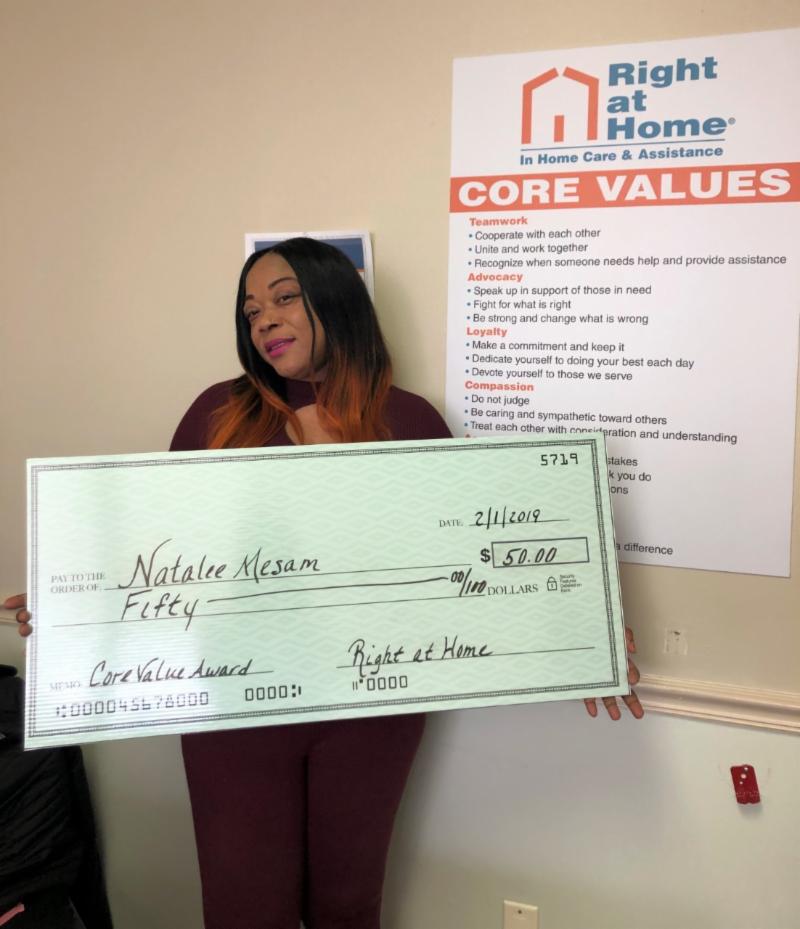

Caregiver of the Month and American Heart Month
January 2019 Caregiver of the Month
Natalee Mesam is our January 2019 Core Values Award Winner Caregiver of the Month! Natalee received a $50 bonus check for demonstrating our six Core Values with her Clients.

What is a Core Value? Simply put, a Core Value is a deeply held belief that determines how a person behaves in different situations. Businesses use Core Values to guide their decisions to make sure that their employees are reaching the company's goals.
Right at Home Core Values:
► Teamwork
► Advocacy
► Loyalty
► Compassion
► Accountability
► Pride
Every day, we recognize a Caregiver in our morning meeting that has demonstrated one of our Core Values with their clients. At the end of the month, their names are entered into a random drawing for the $50 bonus. Thank you, Natalee, for being an exemplary Caregiver and embodying our Core Values every day.
American Heart Month

February is American Heart Month, an opportunity to raise awareness of heart disease, the number one cause of death for men and women in the U.S. More than 81 million people suffer from life-threatening conditions including coronary heart disease, heart failure, stroke and high blood pressure. Each day, nearly 2,300 people die of heart disease — one every 38 seconds. However, because of advances in heart surgery and patient care, seniors who suffer from heart attacks and chronic heart disease can learn to live with their conditions and continue leading healthy lives.
“Suffering from a heart attack and adjusting to life with heart disease can be a challenging and difficult experience for seniors and their loved ones,” said Denise Bernstein, Owner of Right at Home Bux/Philly. “A supportive caregiver can help seniors understand the lifestyle changes necessary for a successful recovery and make the adjustment easier.”
If your loved one has recently been hospitalized as a result of a heart attack, you should discuss the following with his or her doctor:
- What complications should we be aware of? If your loved one suffered a severe heart attack, he or she could be at risk for complications such as arrhythmia, congestive heart failure or stroke. Discuss with the doctor how to recognize the signs of developing complications as well the symptoms of a second heart attack.
- What medications will my loved one need? Medications often prescribed for patients suffering from a heart attack include statins, ACE inhibitors, beta blockers and aspirin. Discuss with the doctor how to help your loved one manage his or her medications and understand the side effects of each prescribed drug.
- How long will my loved one need care? Find out what types of rehabilitation and therapy services your loved one will need, including physical therapy, occupational therapy, speech therapy or cardiac rehabilitation. Depending on the severity of the heart attack, your loved one may require more help than you can provide. In-home care organizations such as Right at Home can provide respite for family caregivers, offering services including medication reminders, transportation to follow-up appointments, light housekeeping and meal preparation.
- What dietary changes will my loved one need to make? A healthy diet is one of the best ways to lower the risk of additional heart attacks. Your loved one’s doctor or nutritionist can help develop guidelines for a heart-healthy diet low in saturated fat and salt with a variety of fruits, vegetables, whole grains, lean meat, fish and low-fat dairy products.
- When can my loved one resume his or her normal activities? In many cases, a heart attack patient can resume normal activities within a few months. Your loved one’s doctor can help set a realistic timeline for recovery based on the severity of the heart attack.
Family caregivers play an important role in the recovery of heart attack patients. Seniors can remain positive and healthy for many years following a heart attack when they receive physical and emotional support from their loved ones.



